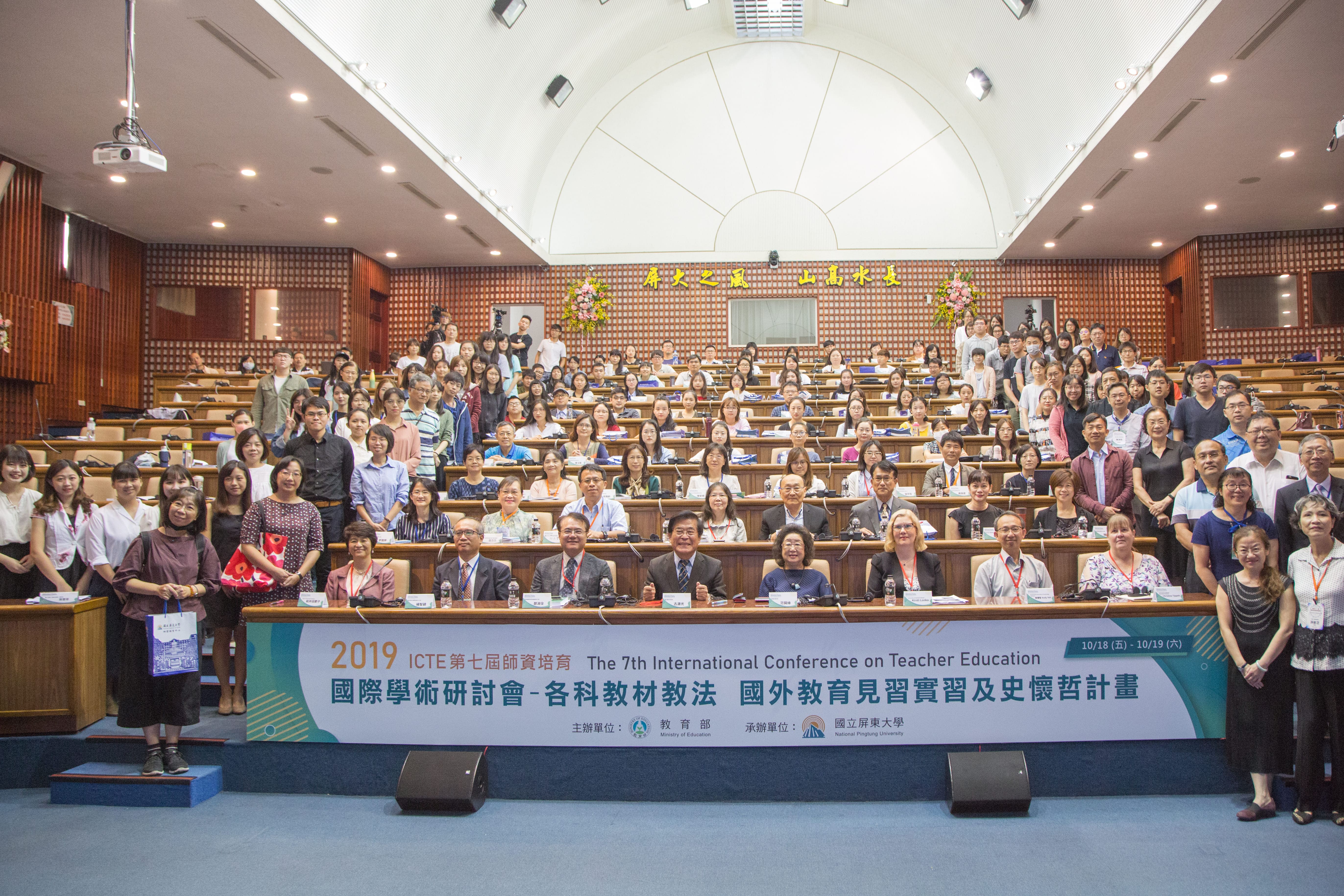2019 the 7th International Conference on Teacher Education held by the Ministry of Education The Achievement Demonstration of Our Nation’s Teacher Education and Connection to the International World

On October 18, the press conference for the “2019 MOE 7th International Conference on Teacher Education: Focusing on Teaching Methods and Materials, Overseas Teacher Traineeships, Overseas Teaching Internships, and the International Schweitzer Program ”was held in National Pingtung University. Political Deputy Minister of the Ministry of Education, Fan, Sun-Lu, said that inspired by international trends of flipped classrooms, different developments in education in Taiwan have been observed in recent years. Teachers often have international interchanges while preparing and creating new teaching materials and methods, for example, the Sharestart workshop, where teachers guide other teachers so that they can be seed teachers. This ongoing rolling power is a new phenomenon, never observed before in the decades of Taiwan education history: “teachers themselves are stepping forward.”
The importance of this conference lies in the combined implementation of discussions at the conference, overseas teacher traineeships, overseas teaching internships, and the international Schweitzer program. Through the integration of theories and practices, and in response to new challenges in teaching scenes, the image of teacher education in Taiwan is depicted in a new light.
The MOE Political Deputy Minister, Fan, Sun-Lu, expressed the view that overseas scholars are familiar with Taiwan and that our nation’s teacher education builds great partnerships with countries around the world. Since the implementation of overseas teacher traineeships, and overseas teaching internships, started by the MOE in 2016, until 2019, about 1,200 student teachers have received subsidies. In 2018, we participated in the International Schweitzer Program, encouraging student teachers to learn and take part in internships in developing countries with the Schweitzer spirit, which shows the trend of progress.
The new curriculum is being launched this year (2019). According to the MOE Political Deputy Minister , Fan, Sun-Lu, the MOE has prepared the new curriculum for nearly 10 years, and the key concept on whether the new curriculum can succeed or not depends on teachers. She said that the MOE, all city, county governments, and teacher education universities have jointly cooperated in dimensions of guidance and preparatory organization, and have carried out a great deal of teaching discussions and research in workshops. All these efforts are aimed at cultivating teachers with student-orientated teaching methods, at fulfilling the literacy-oriented courses in the new curriculum, and at cultivating students with competencies of problem solving, communication, and technology utilization. Therefore, teachers are required to continuously learn and enrich themselves as well.
On October 18 and 19, this academic conference was held. In addition to the participation of experts and scholars of our nation, Professor Kirsti Lonka, University of Helsinki, Professor WAIDA Setsuko, Kyoei University, Professor Andy The, Queensland University of Technology, Professor Christine Tippett, University of Ottawa, and other scholars were all invited. In this two-day conference, with experts and scholars in each academic subject teaching field from our nation and other countries, three keynote speeches, one internal forum, and one international forum were carried out. Among them, student teacher, Fang, Pei-Wen, from National Taiwan University shared her experience in the overseas teaching internship outcomes in Australia.
This conference included six sections of thesis presentation; with a total of 24 theses (including thesis posters). Via keynote speeches and thesis presentations, participants could gain inspiration of new knowledge, and use these new concepts when teaching in schools.
The scholar from Finland, Professor Lonka, talked about phenomena-based learning in her keynote speech, and pointed out the following “miracles” in education in Finland:
- Less expense can create better outcomes.
- Less time spent in school can lead to better learning efficiency.
- Carrying out game-based learning before the age of 7 can lead to greater learning efficiency.
- Science, music, art crafts, sports, and domestic science are all phenomena-based learning subjects in compulsory education.
- Class members are generally from diverse socio-economic backgrounds, for example, the descendants of refugees, and children of middle class
- The interest in sciences and the satisfaction with life that adolescents in Finland have are ranked in the top five in the world.
The overseas teaching internship team to Finland of National Dong Hwa University, which was selected to receive subsidies from the MOE, was also invited to this press conference. They shared how the emotional education is designed and practiced in the preschool education in Finland, and the inspiration they obtained during this process. One teacher student in this team, Zhang, Lin, said that “This internship gave me a deeper understanding of the education in Finland, and I learned that they have combined the “affective development” supported by cognition in many of their courses; they respect very much the opportunities of independent learning for children.”
For the opening launch of the overseas teacher traineeships, and overseas teaching internships, and the international Schweitzer Program, the MOE Political Deputy Minister, Fan, Sun-Lu, the Director of Department of Teacher and Art Education in MOE, Zheng, Yuan-Chuan, the Principal of National Pingtung University, Mike Y.K. Guu, and other guests all attended. After placing the national flags of countries: Finland, Australia, Japan, Canada and other countries in the international display, the MOE Political Deputy Minister, Fan, Sun-Lu, then placed the national flag of our nation, and the display was illuminated to represent the official launch of the overseas teacher traineeships, and overseas teaching internships, and the international Schweitzer Program for student teachers.
